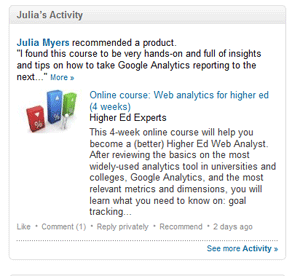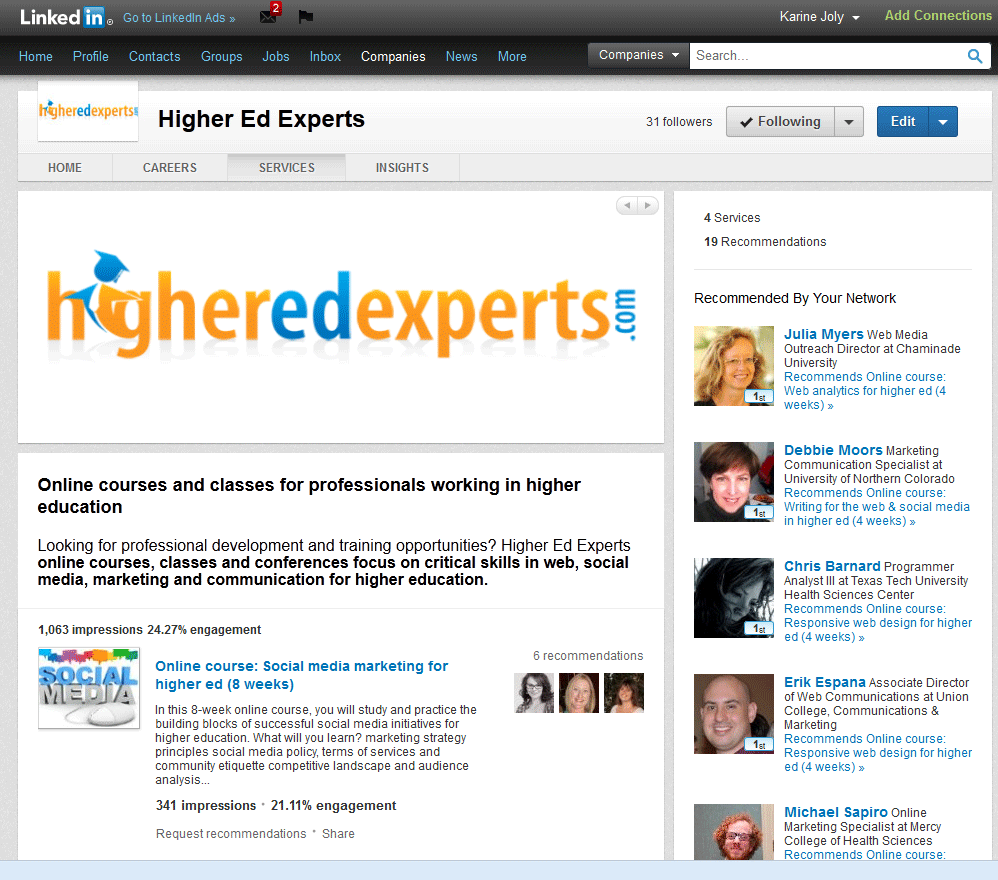Universities and colleges have always relied on alums and current students to show prospective students the value of the education to be received.
As a result, alums and current students are often invited to help their alma mater by talking to prospective students at special events, profiled on the institutional website or in admissions publications, quoted on academic program pages or even asked to blog about their experience and career.
It’s all about authenticity – and third-party validation.
Happy successful alums are the next best thing after a satisfied-or-your-money-back guarantee. They can reassure undecided prospective students that the investment in getting a degree at your institution is definitely the right one for their future.
Putting Linkedin product recommendations to the test
That’s the reason why I think the LinkedIn company page product recommendations could play a very important role in unleashing the power of your alum network to promote your programs – that is if you target adult students looking for a degree or a certificate.
At Higher Ed Experts, our students fit the bill:
- They all work in marketing, communication and web in universities and colleges.
- Most of them have been maintaining a professional LinkedIn profile for quite some time.
- And, they are definitely part of a tight professional community where opinions from professional peers have a high value
So, back in November, I decided to try the LinkedIn product/service recommendation feature for our online professional training programs.
What you need to use Linkedin Product Recommendations for your programs
To use this feature for one of your degrees or certificates, you will have to create a product/service page first:
- Go to your LinkedIn institution page
- Click the blue edit button on the top right of the page
- Select the “add product or service” option from the pull-down menu
- Fill out the product/service form: you can add the name of the program, a description, some keywords, a web address, a few Linkedin contacts and even a YouTube video (nice place to repurpose your student or alum testimonial videos)
Here is the Linkedin program page for my 8-week online course on social media marketing for higher ed:
Best strategy to request LinkedIn recommendations for your programs
Once the page is ready, you can start asking for recommendations from LinkedIn members right from the LinkedIn page by clicking on the “request recommendations” button as long as they are part of your own network.
This works pretty well for Higher Ed Experts as I tried to connect on LinkedIn with all our past students.
But, you will probably have to use a LinkedIn Recommend button on your program web page or send a request via email to a selected group of alums (the ones that are profiled in your articles or on your website to start).
 When a LinkedIn user makes this kind of recommendations, it will be posted to his/her Linkedin profile activity feed and the homepage feed of all the people connected to this specific user. Depending on the timing of these recommendations, the network effect on the reach of these recommendations can be really important.
When a LinkedIn user makes this kind of recommendations, it will be posted to his/her Linkedin profile activity feed and the homepage feed of all the people connected to this specific user. Depending on the timing of these recommendations, the network effect on the reach of these recommendations can be really important.
So, DON’T request recommendations all at once, but spread your “request campaign” on several weeks strategically scheduled depending on important deadlines for your programs.
I do believe this can make a big difference for prospective adult students as I told LinkedIn Higher Ed Evangelist, John Hill, in a tweet a couple of weeks ago:
@linkedinjohn Not the best, but we're using the page in a way that could make a lot of sense for #highered: http://t.co/fB2D1jp9 @linkedin
— Karine Joly (@karinejoly) December 3, 2012
Perfect timing for your test
You should probably test the feature only with a couple of programs first. With many people freshing up their LinkedIn profile in the first days of the year, this is the perfect time for this kind of tests.
Yesterday, I noticed that Webster University has just started to test it with their MS in Forensic Accounting and even got its first recommendation.
Anybody else using or planning to use it?
Would love to see more examples, so feel free to post them in the comments.






